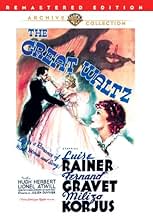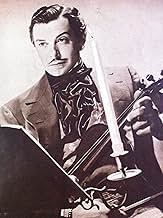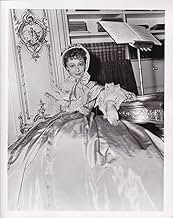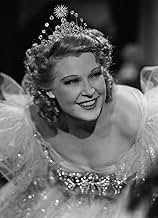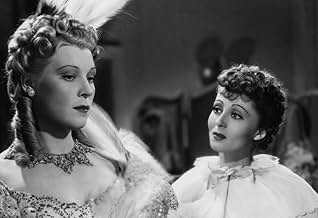IMDb RATING
6.4/10
1.4K
YOUR RATING
Johann Strauss II pursues his passion for waltzes in 1845 Vienna, facing societal resistance. His music gains popularity through opera singers, leading to fame and personal conflicts between... Read allJohann Strauss II pursues his passion for waltzes in 1845 Vienna, facing societal resistance. His music gains popularity through opera singers, leading to fame and personal conflicts between his wife and a passionate affair.Johann Strauss II pursues his passion for waltzes in 1845 Vienna, facing societal resistance. His music gains popularity through opera singers, leading to fame and personal conflicts between his wife and a passionate affair.
- Won 1 Oscar
- 2 wins & 3 nominations total
Fernand Gravey
- Johann Strauss
- (as Fernand Gravet)
Sig Ruman
- Wertheimer
- (as Sig Rumann)
Ernie Alexander
- Revolutionary
- (uncredited)
Featured reviews
A perfect and absolute delight from beginning to end. The great music of Johann Strauss is performed in such beautiful, elaborate settings! MGM reproduced Vienna and the era perfectly. It is too bad this was the only film in which Miliza Korjus appeared. Such a magnificent voice and charming personality! The carriage ride in the Vienna Woods and that final, unbelievable, note she holds for what seems like eternity are never to be forgotten. Luise Rainer is wonderful and could always convey such emotion without ever uttering a word. Perfect casting, with so many great character actors in supporting roles.
10guidon7
Perhaps the number one Hollywood musical film of all time. "Gorgeous Korjus" was coined and used by Louis B. Mayer to promote her film career, which understandably would be short. Not only is she gorgeous in GW but turns in an excellent acting performance which drew an academy award nomination. Her acting role rivals or exceeds consummate actress and two-time academy award winner, Luise Reiner. Displaying the temperament of a real primadonna, Miss Korjus turns on her good and bad sides when you least expect it. Vocal waltzes are extremely difficult to sing and Korjus with her coloratura soprano does admirably. Frenchman Fernand Gravet is believable as Strauss (as far as the film is believable) and ably supported by the likes of Lionel Atwill and Hugh Herbert along with many others, few of whom have a Teutonic accent, but we still have a romantic view of old Vienna. It is not a factual biography, which is stated at the beginning of the film, but there are elements of truth in the composite of Strauss the Elder and Strauss the younger as performed by Gravet (Strauss the Younger was a womanizer and while married actually had a liaison with an opera singer, among others). The Vienna Woods segment is pure joy. Strauss playing Tales from the Vienna Woods on his violin and Carla Donner singing in accompaniment's, their whirling dancing, ending up on the ground, where Strauss goes no further and wistfully admits "Carla, I'm married." The audience, I think, expects a tantrum from Donner at this revelation, but she gracefully takes it in stride and fools us once again with her unpredictability! This scene, to me, was the high point of an exceptional film of the type we shall never see again.
This fictional account of Johann Strauss' life is highlighted by one of the most exquisite scenes in musical history--far from real of course--in which the composer and an operatic diva are driven through the woods in horse and buggy while the countryside comes alive with the sound of music. The pastoral beauty of the scene itself combined with the intricate way 'Tale of the Vienna Woods' is woven into the musical scene (as composer Strauss begins humming the tune along with his diva friend) is just one of the charming highlights of this MGM musical.
Swirling waltzes are captured with such superb angles in the Oscar-winning camerawork, it's no wonder David O. Selznick was impressed enough to insist that his own technical staff derive inspiration from viewing the film.
Soprano Miliza Korjus does some excellent trills as the operatic diva who steals Strauss from his wife (temporarily) until the obligatory happy ending. Luise Rainer suffers gracefully (in an insufferable role as the wife!!) and Fernand Gravet does well as the composer. His scenes with Miliza Korjus are what makes the film the gem that it is. She all but steals the film and was nominated for a Supporting Actress Oscar and then disappeared from the American scene, returning to Europe to resume her operatic career.
Swirling waltzes are captured with such superb angles in the Oscar-winning camerawork, it's no wonder David O. Selznick was impressed enough to insist that his own technical staff derive inspiration from viewing the film.
Soprano Miliza Korjus does some excellent trills as the operatic diva who steals Strauss from his wife (temporarily) until the obligatory happy ending. Luise Rainer suffers gracefully (in an insufferable role as the wife!!) and Fernand Gravet does well as the composer. His scenes with Miliza Korjus are what makes the film the gem that it is. She all but steals the film and was nominated for a Supporting Actress Oscar and then disappeared from the American scene, returning to Europe to resume her operatic career.
Sandwiched,in Duvivier's oeuvre,between two absolute masterpieces "Un carnet de Bal" and the overlooked "La fin du Jour" (some kind of French "Sunset Blvd" ) where the director's pessimism reaches new heights ,"The great waltz " ,unlike another movie made in Hollywood "Flesh and fantasy" cannot be looked upon as a "film d' Auteur".
It's impersonal but it nevertheless displays Duvivier's extraordinary eclecticism."The great waltz" is a good work,made with care and taste and shows that Duvivier could have been a great musicals director,if he had wanted to.Half of the movie consists of instrumentals or songs,which makes sense,for it is a movie dealing with Strauss's life.His private life does not interest that much Duvivier who avoids the traps of a linear biography.However,there are snatches of melodrama towards the end,mainly in the scenes between the moving Luise Rainer and Miliza Korjus in the theater.Fernand Gravey (spelled "Gravet" in the cast and credits)is the only French actor here.He had begun his American career with Mervyn LeRoy in 1937.
All the musical scenes are dazzling ;the "blue Danube" treatment is excellent,a waltz which would be used by dozens of directors,from Renoir ("Boudu Sauvé des Eaux" ) to Kubrik ("2001" ) to Cimino ("Heaven's gate"). Other good sequence: Strauss composing a new tune while he is hearing a horse' s trot.
It's impersonal but it nevertheless displays Duvivier's extraordinary eclecticism."The great waltz" is a good work,made with care and taste and shows that Duvivier could have been a great musicals director,if he had wanted to.Half of the movie consists of instrumentals or songs,which makes sense,for it is a movie dealing with Strauss's life.His private life does not interest that much Duvivier who avoids the traps of a linear biography.However,there are snatches of melodrama towards the end,mainly in the scenes between the moving Luise Rainer and Miliza Korjus in the theater.Fernand Gravey (spelled "Gravet" in the cast and credits)is the only French actor here.He had begun his American career with Mervyn LeRoy in 1937.
All the musical scenes are dazzling ;the "blue Danube" treatment is excellent,a waltz which would be used by dozens of directors,from Renoir ("Boudu Sauvé des Eaux" ) to Kubrik ("2001" ) to Cimino ("Heaven's gate"). Other good sequence: Strauss composing a new tune while he is hearing a horse' s trot.
10Esierra2
I own a VHS copy of The Great Waltz. I have seen this movie I don't know how many times! I was very young when I saw the movie for the first time, and it made a great impact on me and ever since then, I feel the urge to look and hear the magnificent singer and actress that, in my opinion takes the first place in this movie: MILIZA KORJUS. I have managed to collect ALL her recordings, I think., but I never saw the movie as a political issue or as they say here, as anti Nazi film! Nothing of the sort! To me it's a delightful movie and a great vehicle for the display of the many talents of Miliza Korjus and also for the rest of the cast and the romanticism involved in the whole movie.
Did you know
- TriviaToscha Seidel, the Russian virtuoso violinist, was hired especially to dub the solos on the soundtrack for Johann Strauss (Fernand Gravey) and began a new career working as a concert master at MGM and other studios.
- Quotes
Johann 'Schani' Strauss II: Thanks for firing me, Mr. Wertheimer. Goodbye, you worms!
- ConnectionsFeatured in Another Romance of Celluloid (1938)
- SoundtracksTales From the Vienna Woods, Op.325
(1868) (uncredited)
Music by Johann Strauss
Lyrics by Oscar Hammerstein II
Hummed by Fernand Gravey as it is being composed
Sung by Miliza Korjus
Played as background music often
- How long is The Great Waltz?Powered by Alexa
Details
- Runtime
- 1h 44m(104 min)
- Color
- Aspect ratio
- 1.37 : 1
Contribute to this page
Suggest an edit or add missing content


